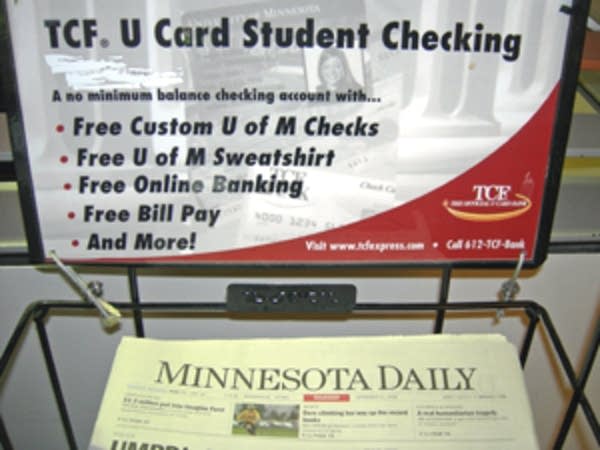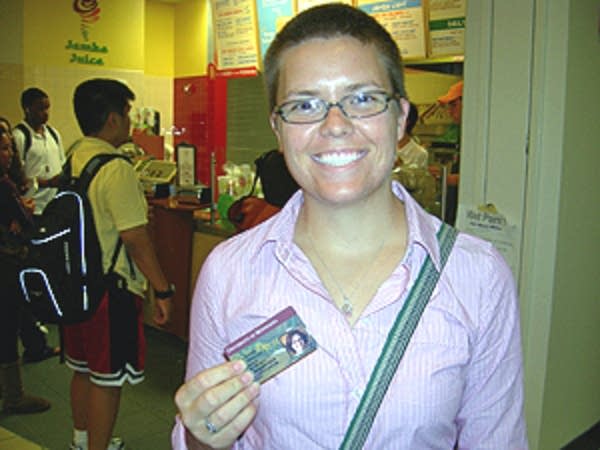TCF banks on college students

If history is a guide, about 80 to 85 percent of incoming students at the University of Minnesota will sign up this semester to bank with TCF.
Many are swayed by this year's signup bonus -- a free university sweatshirt. And senior psychology major Kelsey Renk says there's also TCF's extensive network of ATMs -- on and off campus.

"It's so convenient on campus," she said. "It's almost impossible to not be with them."
TCF's signature product is what it touts as totally free checking. But Renk's TCF checking account has cost her about $400.
Create a More Connected Minnesota
MPR News is your trusted resource for the news you need. With your support, MPR News brings accessible, courageous journalism and authentic conversation to everyone - free of paywalls and barriers. Your gift makes a difference.
"I've had a few problems with overdraft charges, especially my freshman year," Renk said.
TCF currently charges $35 for an overdraft. That's about what most banks charge. Despite her overdraft charges, Renk says she's sticking with TCF while she's still at the U.
In addition to the U, TCF has similar deals with nine other schools, including the universities of Illinois and Michigan.
The $1 million a year that TCF guarantees the University of Minnesota is much more than most schools get from a banking partner. The revenue helps fund everything from student ID cards to scholarships.

TCF also typically kicks in several hundred thousand dollars a year to sponsor student and parent events, at which the bank can promote itself.
"We feel like we really did get something that is kind of a 'wow,'" said Shirley Everson, director of the University of Minnesota's campus card office. "TCF actually won the bid because they came up with the best product offering and best financial offering."
TCF has had a banking partnership with the U since 1995. The bank is also paying the university $35 million to get its name on the U's new football stadium.
But most colleges and universities don't give a bank such access to their student body. David Anthony, director of Ohio State University's BuckID program, has rejected overtures from banks seeking a partnership with the school.
Anthony says that's largely because he doesn't want his university involved in a deal that exposes students to high overdraft charges.
"[U of M students] bounce ... checks, and make a lot of money for us."
"We weren't comfortable with opening up our students to those kind of fees, especially when as an 18-year-old they may not be savvy with traditional banking accounts," Anthony said.
For instance, students may not realize it can take a day or more for a bank to credit them for a deposit. Confusion about that can lead them to use a debit card to spend money they don't yet have access to.
"If they have $2 in laundry, and buy a $3 drink at a coffee shop and then get a sandwich that is $4, those $9 in transactions could equate to over $100 in overdraft fees," said Anthony.
The Center for Responsible Lending estimates 18-24-year-olds pay about $1 billion a year in overdraft fees, largely because of overdraft charges assessed on debit card transactions.
TCF is well known for extracting overdraft and other fees from its customers. At a 2004 financial services conference, TCF CEO Bill Cooper even boasted that U students "bounce ... checks, and make a lot of money for us."
But Mark Jeter, president of TCF's Minnesota bank, says TCF often cuts students some slack on fees.

"We're generous in reversing fees for students," Jeter said. "We're interested in long-term customer relationships. We need to treat them in a manner that really shows we appreciate the business."
TCF says the decision to forgive fees or not is made on a case-by-case basis. Jeter says TCF's goal in establishing banking partnerships with colleges and universities is to build long-term relationships that eventually become more profitable.
Typically, 60 to 80 percent of freshmen sign up for TCF accounts. Overall, TCF says it captures about half the students, staff and faculty at a school.
"Frankly, it's not like we're making a lot of money on this during the time the student is in school," Jeter said. "The hope is to grow this relationship, as their need for additional products and services continues to expand and diversify."
But some students, like Kelsey Renk, do feel TCF has already made a lot of money off of them.
"I guess it's kind of a live and learn, but I also feel I could have been helped a bit more," Renk said.
The university does offer financial education classes, and TCF offers guidance, as well. But many students learn -- sometimes painfully -- on their own about how to manage a bank account.
